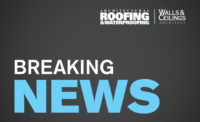At a time when most chief executives see sustainability as critical to their future success, Sika Sarnafil, the worldwide market leader in thermoplastic roofing and waterproofing membranes, has announced a new Sustainability Promise campaign to help roofing buyers evaluate their purchase decisions.
CANTON, Mass.
– At a time when most chief executives see sustainability as critical to
their future success, Sika Sarnafil, the worldwide market leader in
thermoplastic roofing and waterproofing membranes, has announced a new
Sustainability Promise campaign to help roofing buyers evaluate their purchase
decisions.
Sustainability may seem like a simple concept, but it can be
difficult and complex to put into practice. Sika Sarnafil has created a common
set of criteria on sustainability to help architects, specifiers and building
owners to measure various roofing options and to simplify the process. For more
information, visit www.sustainabilitythatpays.com.
“At Sika Sarnafil, we
want to help our customers with a common set of criteria that aids in the
complicated process of deciding whether their purchase decisions meet common
standards of sustainability,” said Brian J. Whelan, Senior Vice President of
Sika Sarnafil. “Our comprehensive checklist provides a clear way to make good,
informed decisions.”
These criteria come at a time when CEOs recognize
sustainability as a source of cost efficiencies and revenue growth as well as a
critical element in driving growth in new markets, according to a survey
conducted by the United Nations Global Compact and Accenture. The study said
executives recognized the complexity of implementing a sustainability strategy
and the need to train managers on sustainability issues. Over 90 percent of the
CEOs said their companies would employ new technologies to address
sustainability such as developing renewable energy and creating greater energy
efficiency.
The key elements of a sustainable roof include a long service
life, the ability to recycle the roof when replacement is necessary, the ability
of a roof to reduce building-cooling energy consumption and related carbon
emissions, and the ability of the roofing membrane to resist the spread of
flames in a fire. The analysis also recommends reviewing a life cycle analysis
of the environmental impacts of the roofing system and asking whether the
manufacturers carry ISO 14001 and Responsible Care certifications, standards
recognized worldwide for environmental stewardship.
Sika Sarnafil Announces New Sustainability Promise Campaign
Looking for a reprint of this article?
From high-res PDFs to custom plaques, order your copy today!



